We posted some ideas about Relationship Centred Practice (RCP) in this blog last November. Based on comments at the time, discussion at our Northumbria Convening and further work by the Relationships Collective we are now posting part two. Here, we share our initial ideas around a ‘framework for RCP’ which starts to unpack different layers and dimensions. Once again we would love to hear what you think. Do these ideas resonate with your work, are they helpful and what’s missing?
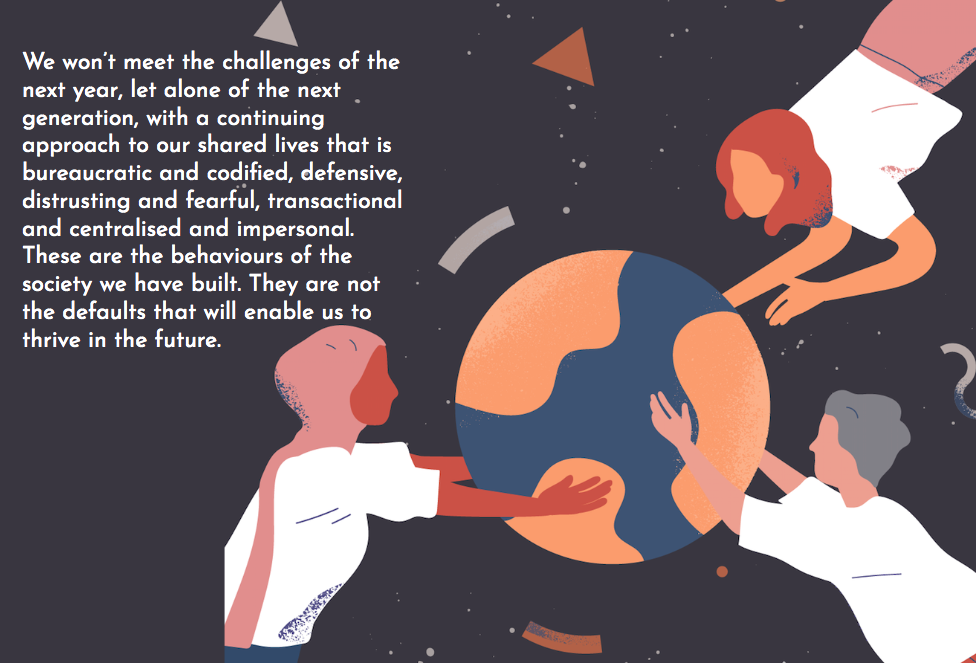
Recap
In our first blog on Relationship-Centred Practice, we shared some thoughts on the sorts of relationships we’re focusing on, explored an initial definition of Relationship-Centred Practice, and identified some common barriers to this way of working.
We defined Relationship-Centred Practice as…
Relationship-Centred Practice puts relationships first. It unlocks potential and meets need by positioning meaningful and effective relationships as the first order goal, both an end in itself and the means by which other goals will be achieved (like better health, stronger communities, greater job satisfaction)
We think Relationship-Centred Practice is characterised by empathetic behaviours such as positive listening, active collaboration, a commitment to continuity, kindness and mutual trust. There is a shared sense of purpose and also of agency – “we can do this together”, capacity for challenge, for holding tensions alongside compassion and forgiveness, a focus on assets rather than deficits and sufficient versatility to adapt the practice to the individual rather than fit the individual to the programme. It is informed by experience, but not scripted. The most effective relational practice is not enforced from without. It is compelled from within, willing and dynamic.
Since publishing this blog in November 2022, we’ve had many conversations which have helped to shape and evolve our thinking. Here, we share how our thinking has evolved and invite a further round of thoughts and reflections.
Why do we think defining relationship-centred practice is useful?
We often talk about relationships being common sense but not common practice. We think there are a few key reasons behind this:
- Whilst many of us intuitively believe that everything works better when relationships are valued, we’ve created systems and protocols and cultural norms which actively get in the way of relationship building.
2. When we think about working in ways that are relational, we often see it as being something of an exclusive personality trait. Whilst it’s certainly true that relationship building comes more easily to some, we also think it’s something that can be supported, nurtured and enabled, or something that can be discouraged, belittled and obstructed.
3. Relationships are often seen as a ‘frilly extra‘; a ‘nice to have’ that creates a friendlier working environment but which, ultimately, comes second (or third or fourth) to the ‘bottom line’. We disagree. We believe that relationships are the way in which other outcomes are realised – from better health and educational outcomes to improved wellbeing and stronger communities.
We hope that in offering a framing and language around Relationship-Centred Practice:
- It is taken more seriously and given greater prominence and attention
- Those who work in relationship-centred ways feel seen, celebrated and validated
- There is greater clarity about what’s needed to deliver and support relationship-centred practice
What: Towards a framework of Relationship-Centred Practice
RCP is determined as much by the policy environment and organisational protocols as by the characteristics and values of the practitioner. For RCP to become widespread and embedded there needs to be focus, intention, investment and support at multiple layers of an organisation, a community or a system.
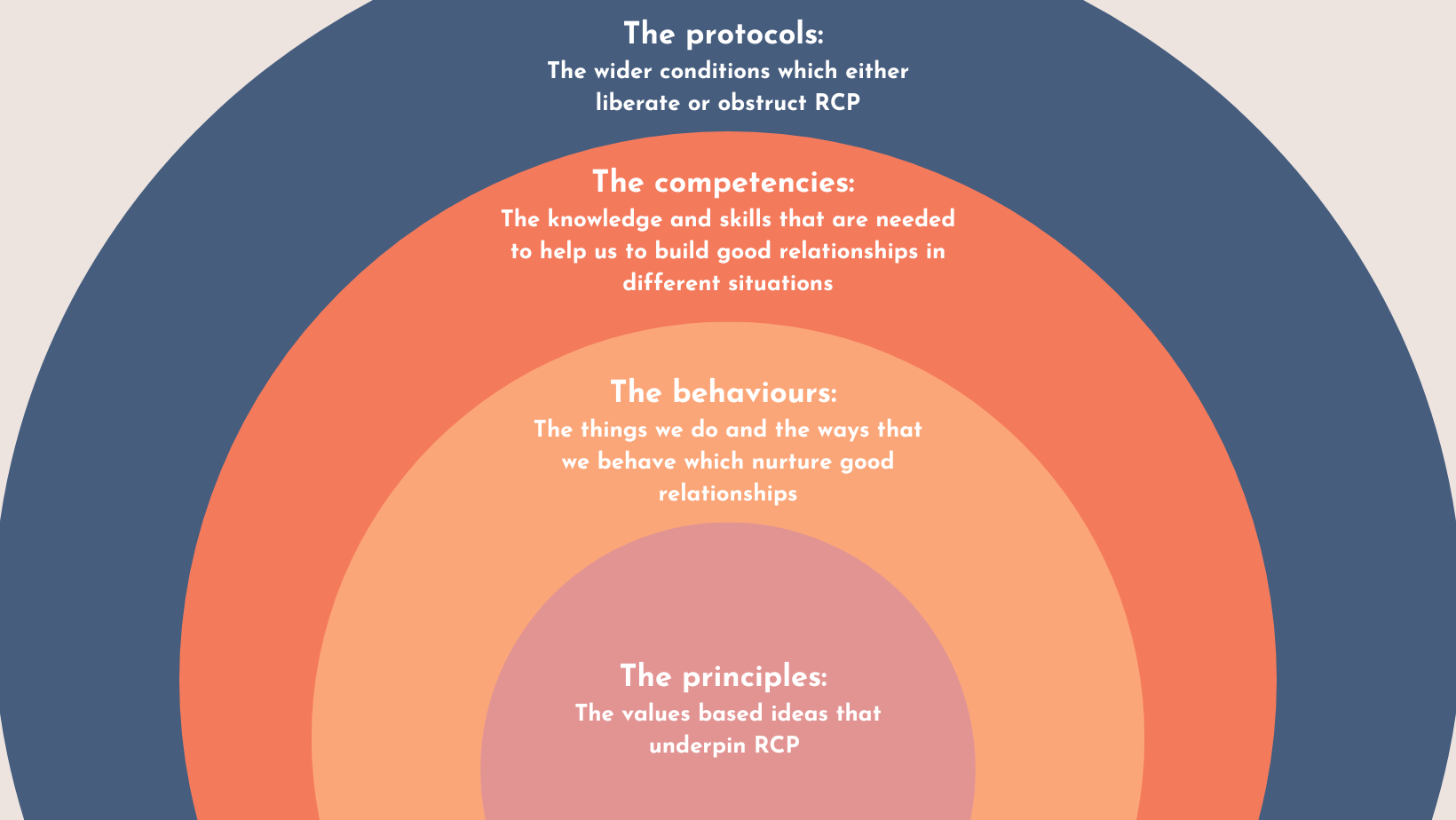
This emerging framework is an attempt at articulating those different layers of RCP. Do these feel relevant to your practice or your place? What’s missing?
Underpinning principles
We think that underpinning RCP is a set of principles or commitments. We think these are transferable across sectors, specialisms and approaches and without which a commitment to putting relationships first cannot be realised. We think these principles are something along the lines of….
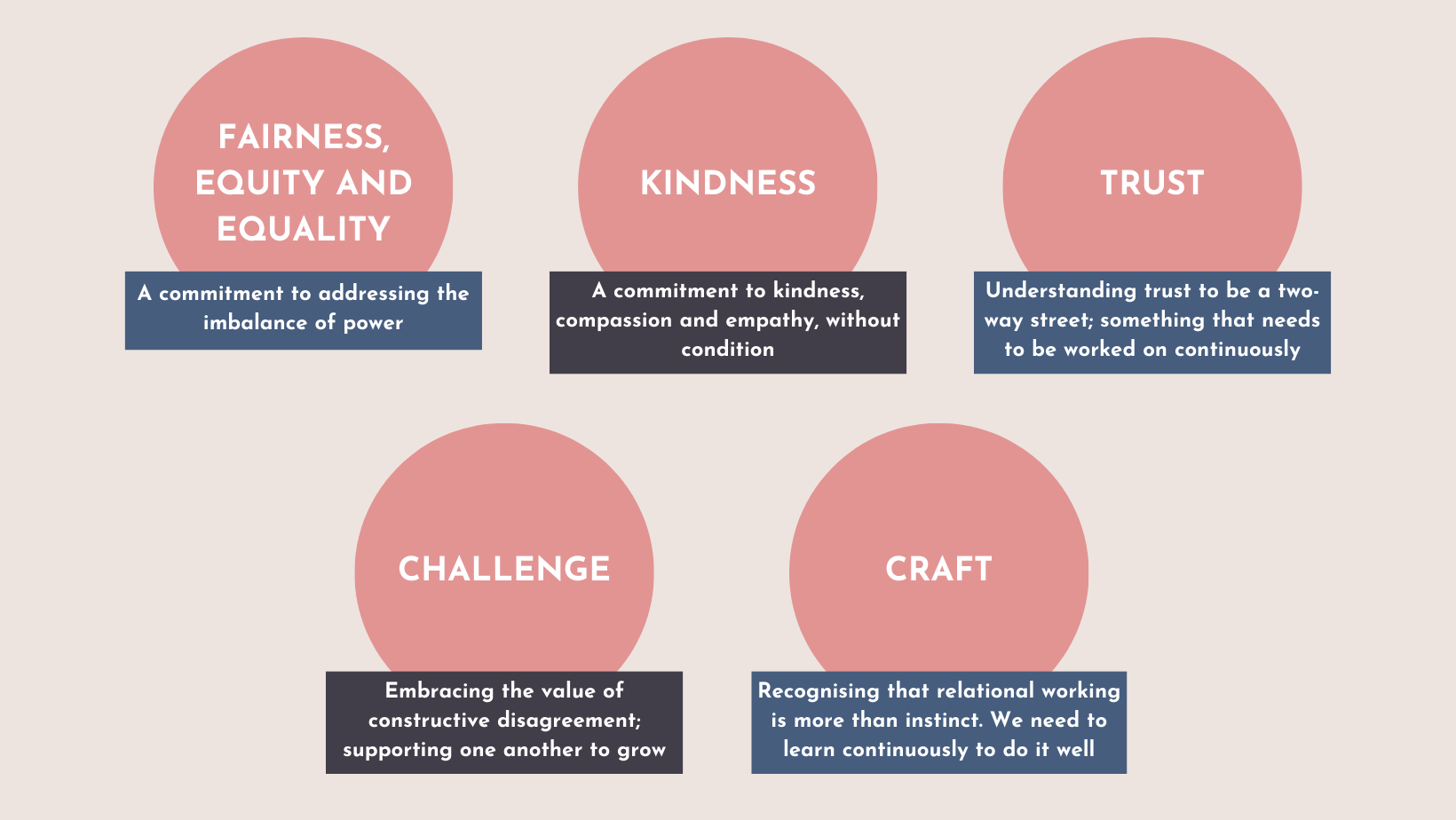
What do you think? Do these principles resonate? What’s missing?
Characteristic Behaviours
Emerging from this set of principles are a set of behaviours that characterise RCP. These behaviours are an expression of the principles that sit at the heart of RCP and are the observable components of RCP. Some of these behaviours might be transferable from role to role, and from organisation to organisation, others might be more specific to certain situations.
These behaviours include things like….
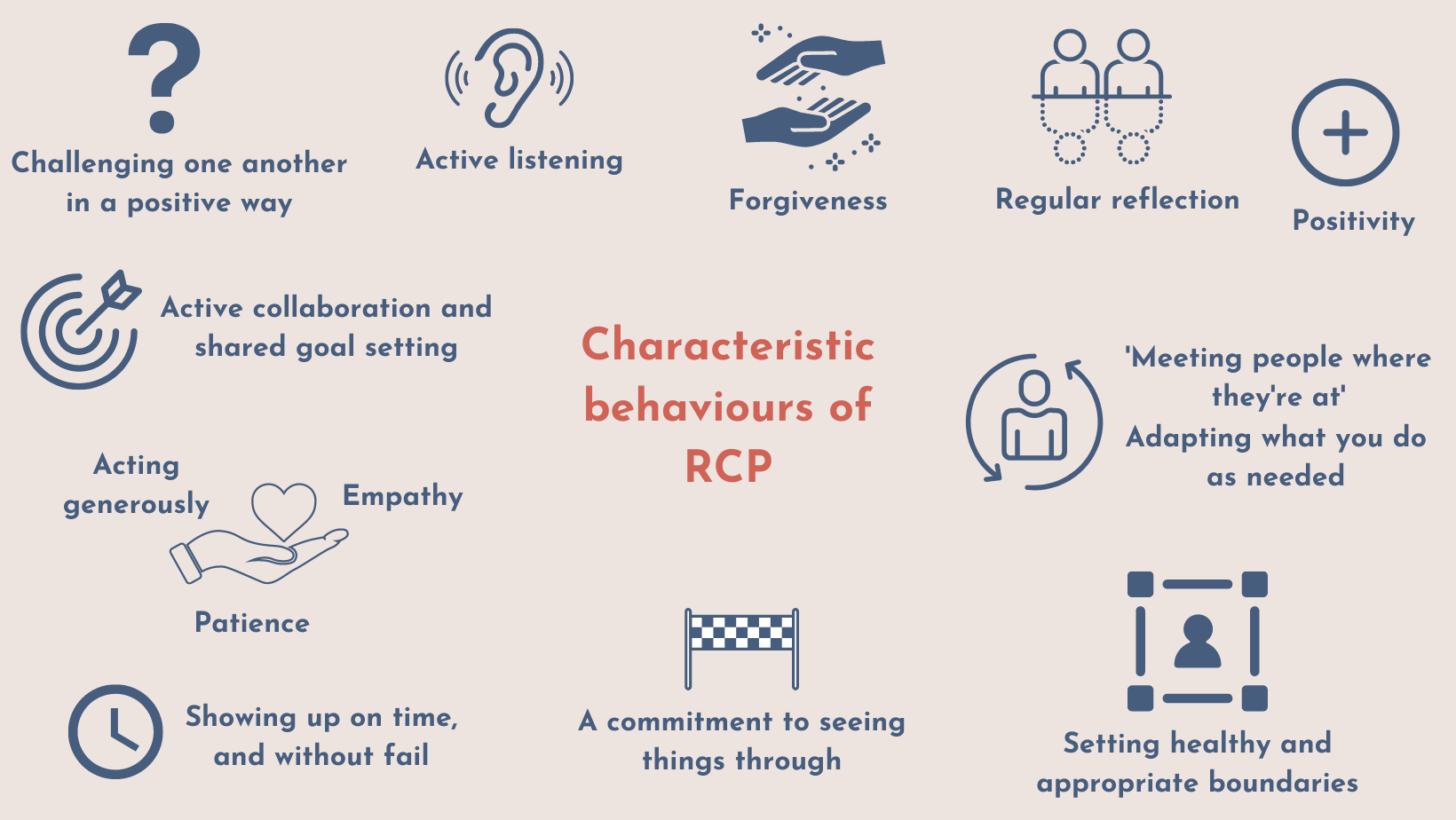
Do these resonate with your own Relationship-Centred Practice? What would you change or add?
Individual Competencies
Enabling these sorts of behaviours are a set of competencies; knowledge and skills which enable us to build relationships in different situations and contexts. Some of these competencies are widely applicable; skills such as active listening, others more specific to certain situations, such as conflict transformation.
The importance of learned knowledge, skills and competencies points to the role of education, continuous professional development and mentorship.
What competencies enable you to work relationally?
Enabling protocols
Wrapping around all of these is a set of enabling protocols which can either inhibit or enable relationship-centred practice. Without the appropriate protocols and permissions embedded in organisations, systems and structure, the relationship-centred practitioner will always be a maverick, dependent on managers “turning a blind eye”. In this context it is very likely that the approach will be abandoned, and good work lost, when individuals move on.
To build the sort of society that we dream of requires an enabling environment. We saw a glimpse of that environment during the early stages of COVID and are working with the Relational Councils Network to make it a permanent fixture.
What are the protocols, permissions, policies or conditions which help or hinder RCP in your place?
When: When is relationship-centred practice relevant?
In the opening section of the first blog we intended to introduce a definition of a good relationship. As Alan Hudson and others pointed out we muddied the waters by comparing Good Relationships with Transactions. There are three distinctions to be made;
1. First, there is the difference between a relationship and a transaction. One is not intrinsically preferable to the other. It all depends on the context. For example, I have a relationship with my son. My association with the rail company from whom I bought a ticket is purely transactional.
2. Second, there is nothing inevitably bad about a transaction. If the ticket is supplied promptly and fairly it was a reciprocal exchange and a good transaction.
3.Third, relationships aren’t always good. They can be abusive, controlling or extractive. Just as there are good and bad transactions, there are also good and bad relationships.
This leads us to suggest some defining, and some common, characteristics for good relationships and good transactions.
- A good relationship is unique and fair. It’s unscripted, organic and empathetic.
- A good transaction follows a standard course, it is efficient and fair.
- Good relationships and good transactions are equally trusting, reciprocal and reliable.
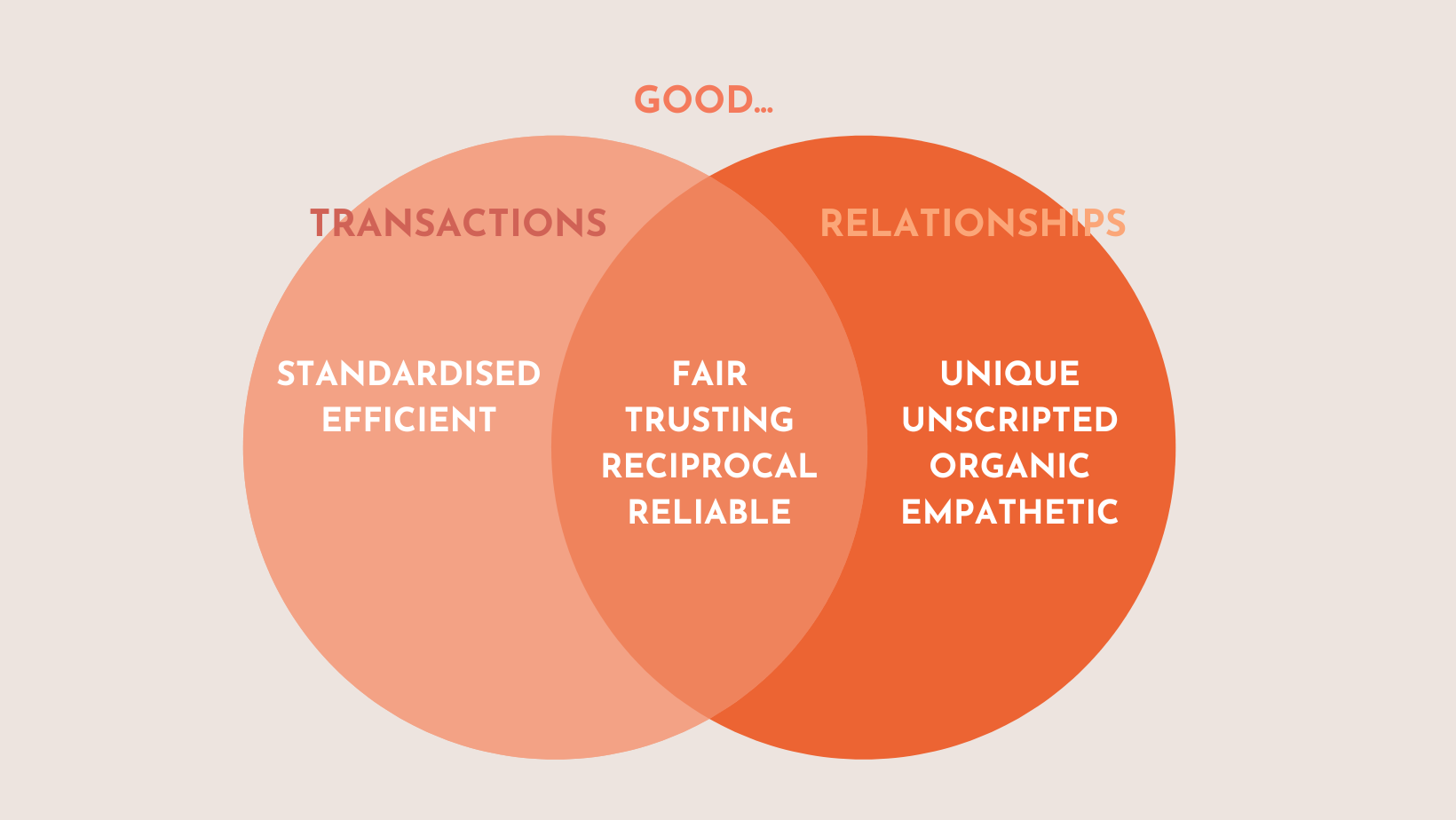
Sometimes a good transaction is most appropriate but sometimes, and particularly in the face of complex situations and challenges, a good relationship is needed. Where this is the case, we think RCP offers a way forward.
The next step
We’d love your feedback on whether this framework feels relevant and useful, and on the values, behaviours, competencies and protocols that constitute RCP in your place.
We’re hosting a number of ‘drop in sessions’ over the course of May and June where anyone can come along to share their thoughts and meet fellow relationship-centred practitioners. Alternatively, if you’d prefer to do this in a one-to-one setting or in writing, please get in touch with either david@relationshipsproject.org or immy@relationshipsproject.org
Thank you to everyone who has helped shape this thinking so far.

I see 2 other principles:
Reciprocity – there is a wealth of research on how this enhances everyone’s well-being. I see you mention it lower in the web-age, but to me it should be a headliner. In our evaluation of co-production in Wales it was this principle that brought the most reward for participants, especially those who have been labelled by others as having nothing to give.
Vulnerability – Martin Buber talks about I-It and I-Thou relationships. The first instrumental and detached and the second attached and vulnerable. His thinking was taken-up by Tom Kitwood in his pioneering relationship-centred practice with people with dementia. I think this principle underpins an inherent need to provide emotional support to people working in relational ways.
A couple of brief comments on this excellent framework: There’s nothing I’d disagree with, and its always easy to add more, but I did wonder whether ‘protocols’ need separating into two. Protocols implies something that an organisation can create around service design, delivery and culture. These are important, but maybe worth distinguishing from the wider environment, or the broader context, that an organisation may help to shape but has less control over, than protocol implies (and with the protocols being ways of managing those constraints).
I was also interested in the distinction between transaction and relationship. I thought in some cases distinctive characteristics and evaluative qualities of what ‘good’ might be were blurred. So a good transaction with a stranger can be unique and unscripted, but not a relationship. A transaction is an exchange with standardisation and efficiency being valuable when they operate at scale, but volume is not a necessary property of being a transaction.
I’d distinguish relationships by their time orientation. A standard distinction between interaction and relationship is “Relationships involve a series of interactions between two individuals who know each other such that each interaction can be influenced by past interactions and by expectations of interactions in the future.” (Hinde, Robert Relationships: a dialectical perspective Hove: Psychology Press (1997) p.48). A good relationship is thus where some value is created and brought forward in the continuity from one transaction or interaction to the next.
I also think there’s a difference in terms of purpose. The purpose of a transaction is determined more narrowly by the task. A relationship taps into deeper roots of purpose where the relationship may be an end in itself. That is in part what being unscripted and organic enables but the breadth and generosity of purpose in a relationship cannot be reduced to a transaction.
A final thought was that the framework, reasonably, puts the emphasis on the practitioner but relationship centred practice is also shaped by the patient, carer, parent, pupil etc and that doesn’t always come through.
As ever, though, a great prompt for debate and reflection.
Thanks for sharing and asking for thoughts
Love the thinking – some musings below based on my limited view of relationship centred practitioners employed within a system but I guess it could be the same for any practice that wasn’t a “natural friendship”.
– I think the understanding of principles as a core or foundation makes sense – system leaders generally commit to the idea of principles – “great, couldn’t argue with that” in principle
– However for me, the ‘protocols’ to enact those principles needs to come next (in design) and feels really important (in Local Area Coordination we’d imagine this as principle informed design) – This is where we are battling against the often perverse logic and behaviours of New Public Management theory driven systems. These systems rejects so quickly reject principles as soon as you try and espouse them. This is because of issues you’ll be totally familiar with of course – risk, monitoring and evaluation, cost effectiveness, cost benefit analysis, politics big and small P, power etc.
– Then I’d put the competencies of the practitioner, informed by the design / protocols (informed by the principles)
– Then the behaviours being the outer layer of the core – the icing on the cake, the outward facing
It’s all chicken and egg though I guess
I find most practitioners are more than willing to be human and relational if the system ‘permits’ and ‘empowers’. It’s when systems become fixated on blame, risk, loss of funding, time and task, efficiencies, needing to prove efficacy etc. they tend to behave in the opposite especially if they are surrounded by a miserable culture with an absence of hope. Conversely though I think if leaders create the conditions for practitioners work collaboratively and relationally (through smart, intentional, principle driven design) then that can end up acting as an anti-biotic the wider system desperately needs, showing what’s possible – igniting hope.
I enjoyed reading your new framework
I noted you were open to feedback and wonder if the below might be useful?
1) love all the principles and wonder if another one might be missing that recognises the value of life/people over economic benefit, which often gets in the way of putting people first.
2) for the behaviours, I wonder if you would consider having a trauma-informed approach? Examples of behaviours are: knowing how to identify when someone is being triggered and supporting them as needed. Or ensuring no harm is done through working to change power structures, etc. all this is particularly important for historically excluded, discriminated and marginalised individuals, groups and organisations.
Thanks for sharing your latest blog draft, I really enjoyed reading what you have done so far. A couple of thoughts came to mind when reading.
1. Is there space to add something on reflection and enquiry? I thought these could be added to the list of descriptors you use at the start of the piece.
2. I also think the idea of autonomy is important in relational models, maybe this ties in with the asset model you refer to.
As an afterthought I found myself drawn to Martin Buber’s work on education, where whilst acknowledging the differentiated roles we play in learning relationship, we all have to turn up and play our part; in the I/Thou way he talks about – hope this helps.
Thanks for your latest piece on a framework for RCP.
As ever, I love the way it’s presented, with a wonderful mix of structure and openness, which for me makes it easy and worthwhile to engage with. And the pictures are beautiful!
Overall, I very much appreciate your efforts to develop a framework for thinking about relationship-centred practice, and in particular your efforts to do this in a multi-level way (which is one way of thinking about multi-component, but not the only way).
The questions I had were firstly about the sequencing of the layers of the onion, and secondly whether onion layers/rings around a core is the best way of presenting things.
More specifically, the idea that competences and protocols come/be considered after behaviours seemed odd to me. A different way of thinking about it would be to see behaviours as what results from the application of principles/values, and competencies, with these two elements then filtered through or supported by protocols, which leads to behaviours.
And, it’s when more than one person’s behaviours gets combined that you end up with a better or worse relationship. [I think having relationships explicitly in the framework might be good].
Thank you for this framework. It’s great to see all these elements together and think about how these sit with and are interlaced with one other. I have some offerings, mainly from a practice lens, so these may not be widely relevant, instead up for discussion.
Principles:
I’d agree with Nick’s comments about highlighting reciprocity. Perhaps this sits in the trust element of the principles. Interestingly participants on a project I worked on recently called reciprocity a ‘two way street’. It was really important to them that relationships felt liked they flowed both ways and we got to a point where participants recognised reciprocity relied on an understanding of what people appreciated and were able to offer each other, and that this might not always align with what people needed and wanted. Personally, I also love that reciprocity is part of indigenous principles and ways of being, and extends beyond people to communities and nature.
Behaviours:
I’m curious about positivity being a behaviour. I understand continual negative contributions can derail a process and relationship building and development, however I worry this encourages people to only contribute in positive ways. Frustrated, sad and negative contributions can come from a place of caring and if there is time to work with them can sometimes uncover important gems to work with. I wonder if a different term would be useful here, one that perhaps invites a balanced approach? I don’t have any suggestions just now but will ponder this.
I found participants have identified it is important to be open minded when engaging in work that is about relational behaviour or culture change.
I like an idea shared by Brené Brown that once behaviours are named they also need to be described so they can easily be operationalised and evaluated. I wonder if this would be useful addition to the framework? (Example here – https://bit.ly/3MsvpZ8)
Individual competencies:
One of the things that may influence how we show up in relationships I think can come from how self-aware we are and are becoming. I’m not sure if this is an individual competency or a behaviour but wonder if it’s a way in to enable people to track their own personal learning during relational work? Perhaps there is an opportunity for an open prompting tools to enable people to identify that their competencies are and those they are growing.
People being clear about their motivation to engage in the work.
Enabling protocols:
I agree reflection is a needed behaviour and definitely part of the craft of RBP. I’d add to this I think people need to be given time and permission to do this as it can be an easy to miss out, tending to come at the end of a period of time or work. As we tend to work in a fast paced world this action is sometimes not valued as much as moving on to the next thing, however I’d suggest (alongside many other authors) this is a key moment of learning and over time something people can start to value, so I tend to think of it as an enabling protocol too.
Sense of safety – I think this needs to be facilitated by someone but created by the group through things like co-designed or transparent and clearly communicated and discussed: working together agreements, communication channels, governance structures, process description (even if it’s fluid and up to the participants – being clear about where those spots are), roles and responsibilities. Plus I’ve found it can be useful to talk through what behaviours people expect from one another to feel respected and what people may do if they do not feel respected or structures are not working as planned. I saw a quote by Stephen Porges the other day “If you want to change the world start by making people feel safer” which I really loved.
Time for preparation – whether that is developing knowledge of a topic or service from a lived experience point of view, service practitioners perspective, and from what evidence suggests works.
Time for building confidence in oneself self an a community.
Time for connection, joy and laughter.
Valuing diversity of perspectives, integrating these perspectives, and enabling people to engage and work with diversity.
Translators – people who help other see things or understand things from other perspectives. These roles may organically arise in a group or be key to the role of a leader/facilitator.
Balancing responsiveness with sticking to the plan.
Ability to communicate the value of experiential learning.
I’d agree with Jess about the need for a Trauma Informed approach and that this may need to be involved in the design of work and potentially as an opportunity for learning about trauma and it’s impact on with the people involved in work/service/community development.
Supporting emotional labour – whilst this is my last point I’d say it is one of the most important I’ve shared. Whether this is needed, what it looks like and to what degree may depend the length and depth of work, and where people are starting from. In the work I’ve been part of in a social care setting I’ve found it can be necessary for both practitioners and participants.
Layout of the framework:
I love the imagery on the website and wondered if some of this could be used more in the framework so there are people present?
I wondered also if the principles are perhaps foundations underneath people that they build on together and behaviours, competencies and protocols surrounding the people in layers, effecting and influencing these relationships?
Thank you very much for this valuable work. I think it is well thought through. In terms of eventual pieces missing, I would add curiosity – a genuine interest to know the other.
And particularly in times of relations that are cross-cultural, I would somehow refer to invalidating assumptions – whether coming from different cultural backgrounds and neurological diversity. Meaning that depending on the above-mentioned factors people will express different behaviors based on the same values, as we all follow different cultural and neurological norms.
thank you for taking the trouble to comment Marta. Please could you explain a bit more about what you mean by “invalidating assumptions”. many thanks David